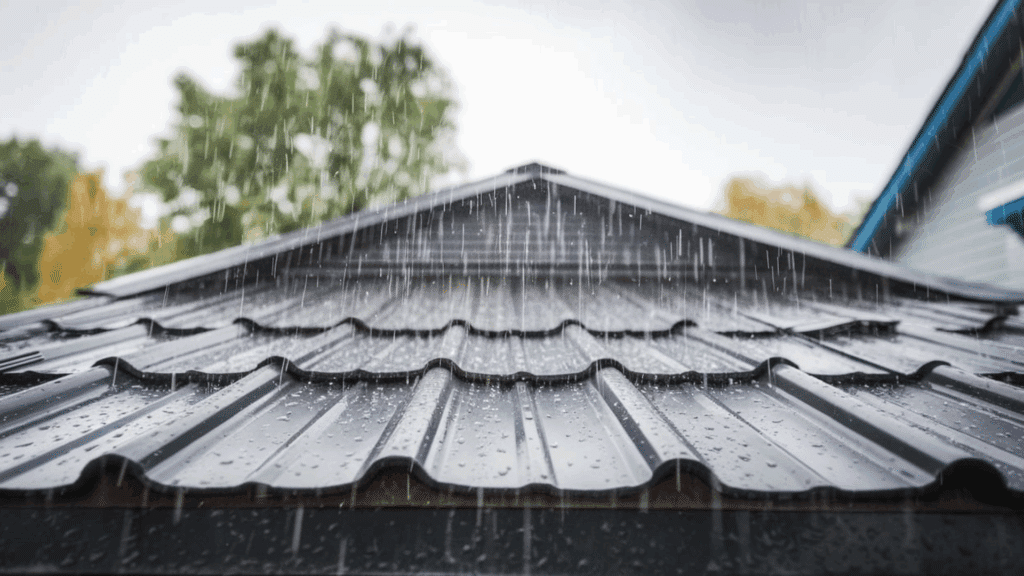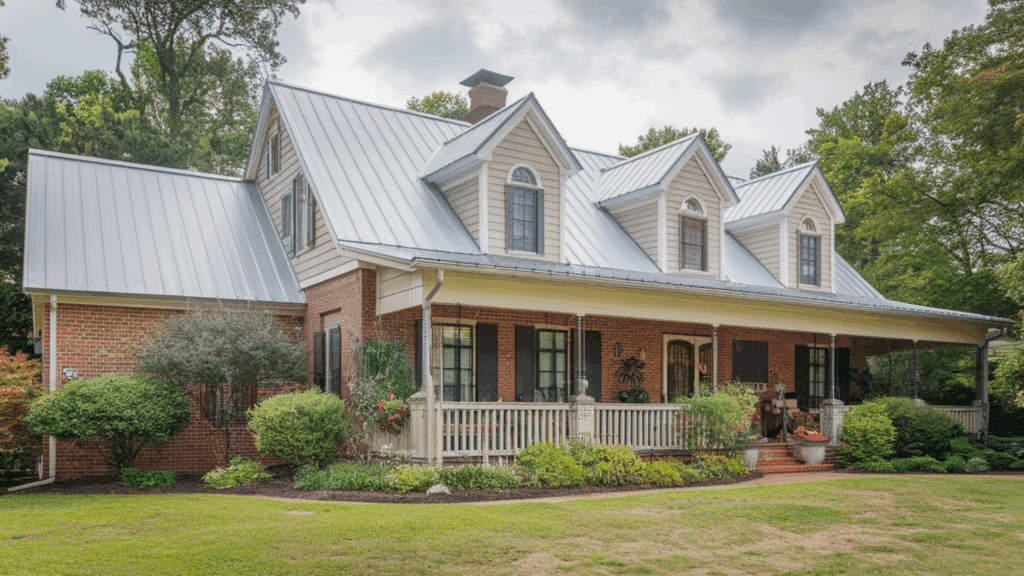When I first considered getting a metal roof, one of my biggest concerns was whether it would be unbearably loud when it rained.
I had heard the myth that metal roofs can make a lot of noise, especially during storms.
But is that really true? If you’re wondering the same thing, you’re not alone. Many homeowners worry about this before making the switch to metal roofing.
In this blog, I’ll clarify the truth about metal roofs and rain noise. I’ll cover:
- The factors that affect noise levels.
- How metal roofs compare to other materials like asphalt shingles.
- Practical tips for reducing rain noise.
By the end, you’ll have a better idea of what to expect and whether a metal roof is the right choice for your home.
Understanding Metal Roof Rain Sound
Many people think metal roofs are loud during rainstorms, and I get why.
When you imagine rain hitting a metal surface, it’s easy to picture a lot of noise. Metal roofs don’t always make that loud, echoing sound you might expect.
The way a metal roof sounds depends on a few factors, including the material and how it’s installed.
But the thing is, not all metal roofs are the same. Some metals, like aluminum, are thinner and may make more noise, while others, like steel or copper, tend to be quieter.
The way the roof is installed also matters. If the roof has a solid underlayment or insulation, it can help absorb the sound and keep it quieter.
So, while metal roofs can make noise during rain, it’s not guaranteed. With the right materials and installation, you may not notice much difference between a metal roof and other types of roofing.
Understanding these factors can help you decide if a metal roof is right for you.
Do Metal Roofs Make Noise When It Rains?

So, do metal roofs make noise when it rains? The answer is yes, but it’s not as loud as you might think.
Metal roofs can make some noise, especially during heavier rain or hail. However, this doesn’t mean the noise is unbearable.
When compared to other roofing materials like asphalt shingles, metal roofs can be a bit noisier during a downpour. But the difference isn’t huge, and it’s not constant.
Heavy rain or hail will make more noise on a metal roof, but it’s typically more of a tapping sound than something overwhelming.
If you have good insulation or underlayment under your metal roof, the noise can be reduced a lot.
The sound might be quieter with thicker materials or a solid roof deck. In the end, yes, metal roofs can make noise in the rain, but it’s not something that should stop you from considering them.
With the right installation, the noise can be kept to a minimum.
Factors Influencing Noise Levels
The noise you hear from a metal roof during rain depends on several factors. It’s not just about the material; how the roof is built, installed, and the environment around your home all play a role.
1. Roof Material
The type of metal used in your roof plays a big role in how much noise you’ll hear. Thicker metals like steel or copper are generally quieter compared to lighter metals like aluminum.
Aluminum, for example, can be more prone to noise because it’s thinner and less dense. So, if noise is a concern, choosing a thicker metal can help reduce the sound.
It’s important to consider the material that works best for you, balancing noise, durability, and cost.
2. Roof Structure
The structure of your roof is another key factor. The decking, underlayment, and insulation all affect how sound travels through your roof.
A solid deck made of plywood or OSB (oriented strand board) helps reduce noise by absorbing sound.
Underlayment can also act as a cushion, dampening sound. Insulation between the metal panels and decking is especially helpful in reducing rain noise. The more layers of material that absorb sound, the quieter your roof will be.
3. Installation Quality
How your metal roof is installed can make a huge difference in noise levels.
Professional installation ensures that the panels are secured tightly, reducing the chance of creaking or rattling sounds.
If the roof isn’t installed properly or if the panels are loose, you might hear more noise, especially during wind or heavy rain. Proper installation ensures that the roof performs well and minimizes noise.
4. Environment
Where your home is located also matters. The presence of trees, nearby buildings, or even wind direction can affect how sound is carried.
For example, if you live in a wooded area, the trees might block some of the rain’s impact on your roof, reducing noise.
On the other hand, if your house is in an open area or near tall structures, sound might bounce off those surfaces, making the rain seem louder.
The surrounding environment can either dampen or amplify the sound, depending on your specific location.
Effective Noise Reduction Techniques
By making some adjustments to your roof’s structure and materials, you can minimize the sound and enjoy a quieter home. Let’s look at some of the best techniques to reduce noise.
1. Insulation
One of the best ways to reduce noise is by adding insulation or underlayment beneath your metal roof. Insulation acts as a sound barrier, absorbing the noise before it reaches the inside of your home.
Underlayment can also help by providing an additional layer of protection, reducing the impact of rain hitting the roof.
By adding these materials, you’ll notice a significant drop in the amount of noise you hear, especially during heavy rain.
2. Spray Foam and Soundproofing
Spray foam insulation is another excellent option for reducing rain noise.
This material can be applied between the metal panels and roof deck, filling any gaps and creating a thick barrier that absorbs sound. Soundproofing materials, like foam boards or acoustic panels, can also be used to reduce noise.
These materials are specifically designed to block and absorb sound, making them an effective solution for a quieter roof.
3. Roof Decking and Design
The roof decking and the design of your roof can play a big part in how much noise you hear. A solid deck made from plywood or OSB (oriented strand board) can help dampen sound.
Additionally, the slope of your roof can also influence how rain hits the surface.
A steeper roof helps the rain to run off faster, reducing the amount of noise generated compared to a flatter roof, where the rain may pool and create more noise.
4. Soundproofing Products
There are also specialized soundproofing products designed specifically for metal roofs.
These include acoustic underlayment materials, foam insulation panels, and roofing membranes that absorb sound.
By adding these products during installation, you can drastically reduce rain noise. If noise is a concern, investing in one of these soundproofing solutions could be the way to go.
Metal Roof vs. Asphalt Shingles: A Sound Comparison
When considering a new roof, you may wonder how metal roofs compare to asphalt shingles in terms of noise. Both materials have different noise levels, durability, and other factors that affect their overall performance.
| Feature | Metal Roof | Asphalt Shingles |
|---|---|---|
| Noise During Rain | Louder compared to asphalt shingles, especially if installed without insulation. However, proper insulation can reduce noise significantly. | Quieter than metal roofs, as asphalt shingles absorb sound better. |
| Sound Insulation | Requires extra insulation or underlayment to reduce noise. Thicker materials like steel or copper can help. | Naturally better at sound insulation due to the composition of the material. |
| Durability | Highly durable, lasts longer, and withstands extreme weather conditions better than asphalt. | Less durable, may need replacement or repairs sooner, especially in harsh climates. |
| Cost | Generally, more expensive to install, but it can last much longer, making it a good investment over time. | Less expensive to install initially, but may require more maintenance and replacement over the years. |
| Maintenance | Low maintenance once installed. Requires fewer repairs over time. | Higher maintenance, especially in areas with extreme weather or aging shingles. |
| Energy Efficiency | Reflects heat and can help keep your home cooler in hot climates. | Absorbs heat, which can increase cooling costs in the summer. |
Conclusion
Metal roofs can be just as quiet as traditional roofing when installed correctly.
The noise from rain often depends on factors like the material, insulation, and roof structure. With the right setup, you can reduce or even eliminate much of the noise.
When I decided to go with a metal roof, I was also worried about the sound. But after installation, I noticed the noise was much less than I expected, especially since I opted for good insulation.
Whether it’s noise, cost, or durability, it’s important to think about what matters most for your home.
If you’re considering a metal roof, I suggest you weigh your options carefully. Feel free to share your experiences or ask any questions in the comments.
I’d be happy to offer more personalized advice.

